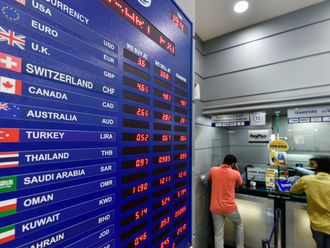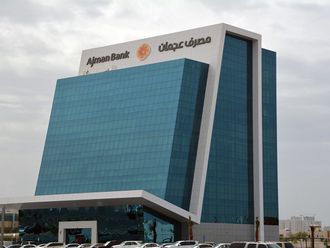London: Whatever the outcome of Britain’s election, the outlook for the country’s banks is worsening.
Almost seven years since the industry received the biggest taxpayer bailout in history, public confidence in banks is near an all-time low and lenders’ efforts to boost profit are being frustrated by investigations into alleged currency and interest rate-rigging. Since the coalition government took power in 2010, UK bank stocks have lost 7 per cent.
Their US counterparts have returned 46 per cent.
“You can hardly believe we are now seven years into this crisis, and we’ve still got billions in fines to come and virtually none of the major banks predicting decent returns for at least another three to four years,” said Ed Firth, head of European bank research at Macquarie Group Ltd. “If you told us that in 2007, we just wouldn’t have believed it.”
The industry’s prospects look to be getting worse as both major political parties distance themselves from the City, London’s financial district, before the May 7 election. The Bank of England is preparing harsher stress tests this year that may force firms to bolster capital buffers and new rules require expensive firewalls to be created around consumer operations. A levy on banks’ balance-sheets has been increased eight times since 2010.
UK tax payers sunk about 1 trillion pounds into banks in 2008 and 2009 to prop up the nation’s failing system, and still own 79 per cent of money-losing Royal Bank of Scotland Group Plc and a fifth of Lloyds Banking Group Plc. Before the election, the tarnished reputation of the industry has taken another battering with HSBC Holdings Plc embroiled in allegations it aided tax evasion.
The Asian-focused lender said last week it may leave London because of rising tax and regulatory costs and Standard Chartered Plc may join them.
The banks remain unloved by the taxpayers who saved them: 68 per cent of Britons said it would be good or would make no difference if lots of bankers left the country, according to a survey by polling company YouGov Plc in November. Seventy-three per cent want to see bankers’ bonuses capped.
The UK’s four largest banks face 19 billion pounds more in misconduct charges in the two years through 2016, according to Standard & Poor’s. In the five years to 2014, about 7.5 per cent of their revenue, or 42 billion pounds, was swallowed by charges for wrongdoing.
Last week’s earnings reports show how the past continues to haunt the banks. Barclays Plc set aside almost 1 billion pounds and RBS another 434 million pounds to settle allegations they rigged currency benchmarks and for selling consumers payment protection insurance they didn’t need or that didn’t cover them. Meanwhile, Standard Chartered’s first-quarter pre-tax profit fell 22 per cent, with all but one division reporting lower earnings.
Bucking the trend, Lloyds reported on Friday that pre-tax profit rose 21 per cent to 2.2 billion pounds, beating estimates. HSBC reports this week.
“Conduct and litigation charges are now a way of life for the UK banking industry,” said Nigel Greenwood, a credit analyst at S&P. “Some form of charge seems probable every year for the larger banks.”
The Labour Party is seeking to capitalize on bankers’ enduring bad reputation by pledging a new tax on bonuses to pay for a youth employment programme and to increase the levy on banks’ balance-sheets. The industry scarcely fared better in George Osborne’s March budget, which boosted the bank levy and barred them from deducting customer compensation from taxable profit, costing the industry 5.3 billion pounds over five years.
The UK is introducing some of the world’s toughest rules on financial conduct, including jailing senior bankers for “reckless misconduct” that contributes to a firm’s collapse, as it attempts to focus accountability on individuals, a source of public anger.
The industry is smaller and less profitable than before the crisis. Together, the banks have eliminated 193,828 jobs and cut 1.82 trillion pounds of assets since 2008, according to data compiled by Bloomberg. The leadership at all five banks has changed since the crisis, twice at RBS.
“The regulations continue to change, capital requirements continue to go up and conduct charges continue. There’s no sign of the end,” said Stephen Carter, co-head of financial institutions for Europe, Middle East and Africa at Credit Suisse Group AG, who advised the U.K. government on the bailout in 2008. “If the level of capital that’s being held in the banking sector is roughly double what it was pre-crisis, by definition the returns have gone down.”
None of the major British lenders were able to make a return-on-equity of more than 8 per cent in 2014, the data show. The average ROE was 17.7 per cent in 2007.
After profitability at Barclays, Standard Chartered and HSBC declined in 2014, the three reduced their ROE targets, citing increased regulation, greater capital requirements and high funding costs.
Lloyds and HSBC are the only major UK banks trading above its book value, indicating investors see the other three as worth less than they would receive if the company failed and liquidated its assets.
UK banks’ “problems were deeper than the market realized, most expectations were for a five-year job, but here we are seven years and counting,” said Chris White, who helps oversee about 3.2 billion pounds at Premier Asset Management Plc. “Banks couldn’t write off everything on day one as their balance-sheets wouldn’t have survived, so they’ve stretched out liabilities over a period of time, yet still there’s more work to be done.”
Investors have pressured bank boards to replace top executives as the share prices suffered. RBS has fallen 14 per cent this year, almost completely erasing its gains in 2014. Standard Chartered plummeted 29 per cent last year, followed by a 10 per cent drop at Barclays.
Standard Chartered replaced CEO Peter Sands with former JPMorgan Chase & Co. banker Bill Winters and overhauled its board, as it tries to reverse two years of falling profits. It may still need to issue shares to bolster capital, analysts say, and the bank is monitored by the US after breaching a ban on transactions in Iran.
The Asia-focused lender is just the latest to change bosses. RBS has had two new CEOs since 2007, with retail banker Ross McEwan now in charge. Barclays also picked a consumer banker, Antony Jenkins, to take over from Robert Diamond in August 2012 after the Libor-rigging scandal.
RBS was meant to have returned to private ownership by last October, according to transcripts of meetings of the Bank of England policymakers that arranged the lender’s bailout. RBS Chairman Philip Hampton similarly predicted in May 2013 the government would be able to start reducing its stake in 2014.
Instead, the lender, recipient of a 45.5 billion pound rescue, had its seventh straight annual loss in 2014. In March, it finally gave up its ambitions to be a global bank, and may cut as many as 14,000 investment-banking jobs to refocus on the U.K. consumer market, according to a person with knowledge of the matter. It had another loss in the first quarter, and the stock still trades below the government’s breakeven price, where taxpayers would at least get their money back.
Banks also have to contend with new rules forcing them to separate their consumer banks from riskier trading businesses to protect depositors. The move may make investment banking operations untenable for the industry, according to Bill Michael, head of Europe, Middle East and Africa financial services for KPMG LLP in London.
“The fundamental problem with the entire debate post-crisis is that we’ve been unable to separate our response to protecting depositors and taxpayers from other banking activities and it’s paralyzing for the industry,” Michael said. “The sector is still at an inflexion point and won’t look like anything it does now in three to four years because none of these banks’ models are sustainable.”












